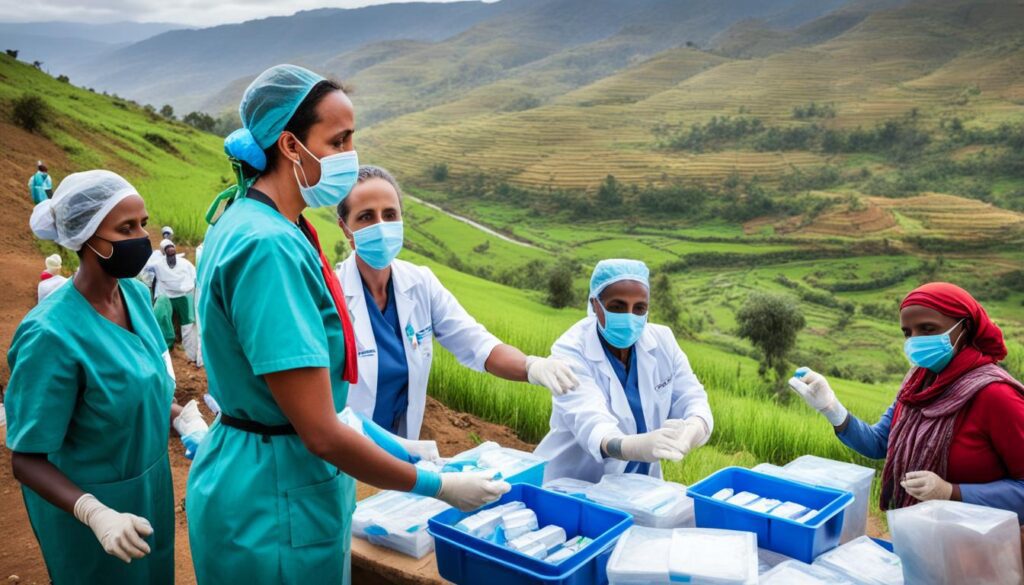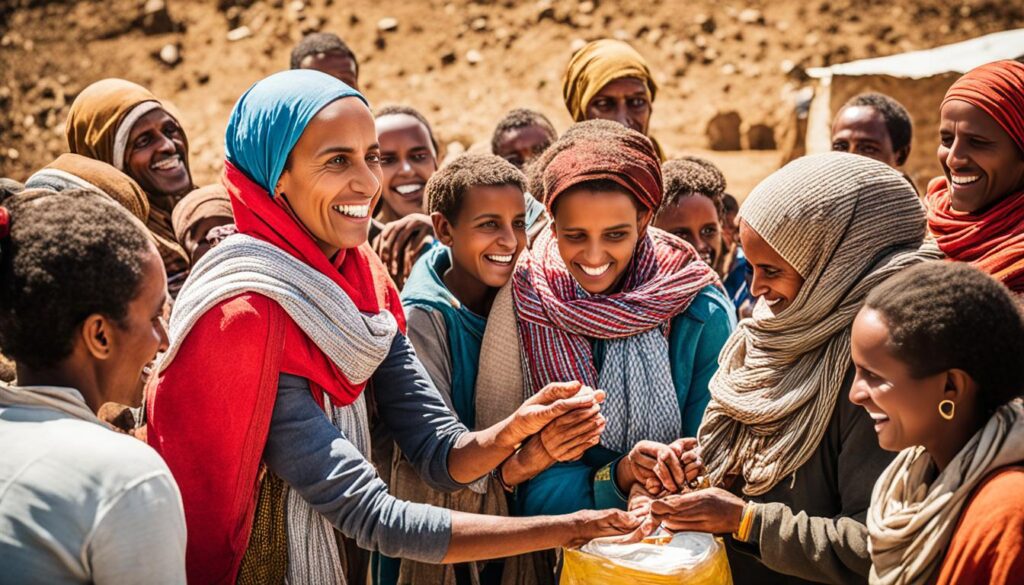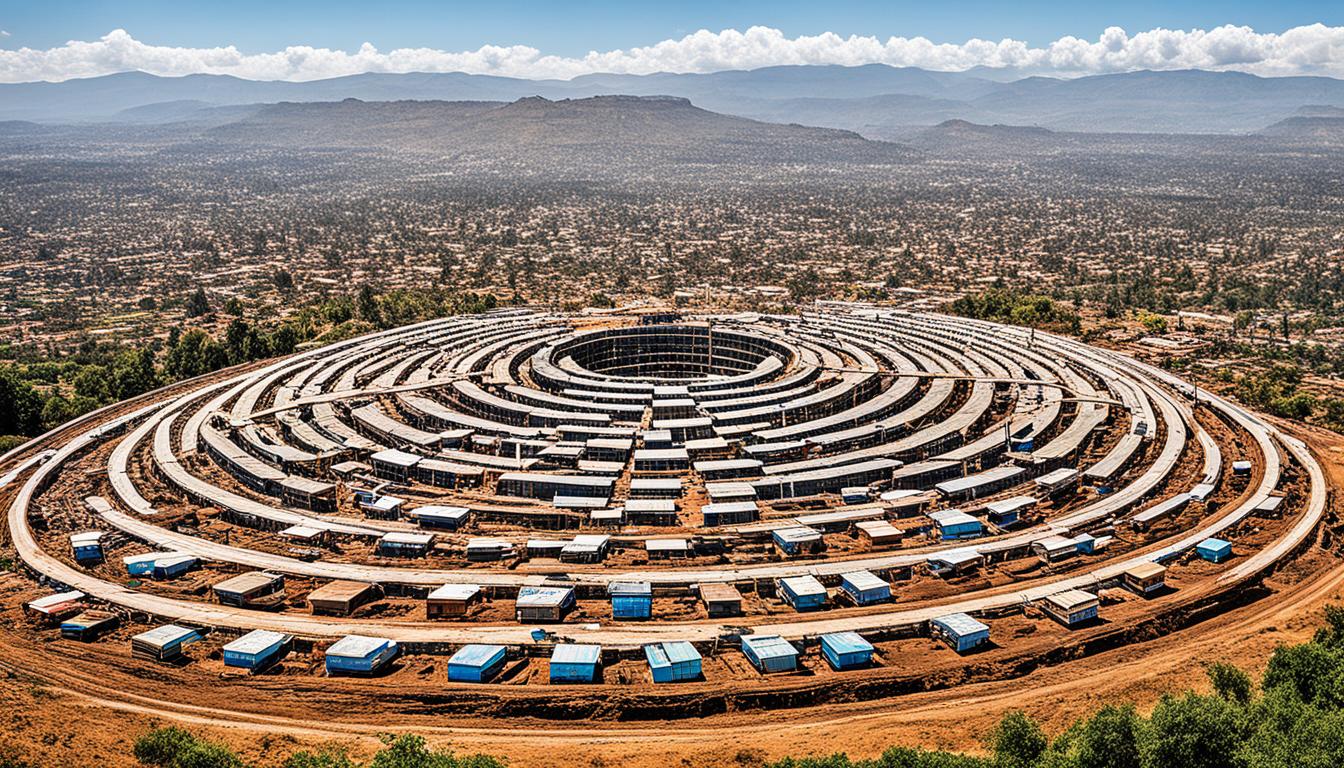Does Ethiopia Receive Foreign Aid?
Did you know that Ethiopia receives significant foreign aid from various countries and organizations? It’s true! The United States, in particular, plays a crucial role as the largest bilateral donor, providing billions of dollars in humanitarian assistance to support Ethiopia in addressing its pressing needs.
Key Takeaways:
- Ethiopia relies on foreign aid to address its significant humanitarian needs.
- The United States is the largest bilateral donor, providing billions of dollars in humanitarian assistance.
- Foreign aid supports various sectors such as health, food security, and human rights.
- Ongoing challenges highlight the importance of sustained international cooperation and assistance for Ethiopia’s future.
Humanitarian Needs in Ethiopia
Ethiopia faces a multitude of challenges that have resulted in significant humanitarian needs. The country has been affected by climatic shocks, conflicts, displacement, drought, disease outbreaks, high food prices, and intercommunal conflict. These factors have contributed to more than 20 million people in Ethiopia requiring aid to meet their basic needs.
In order to address these pressing needs, international aid plays a crucial role, including financial support from countries like the United States. This aid is directed towards various sectors such as agriculture, food security, healthcare, livelihoods, nutrition, protection, shelter, and water, sanitation, and hygiene. By targeting these sectors, aid organizations seek to alleviate the suffering caused by these challenges and promote sustainable development in Ethiopia.
Humanitarian Needs Overview
For a comprehensive understanding of the humanitarian needs in Ethiopia, here is an overview:
- Climatic Shocks: Ethiopia experiences recurrent natural disasters such as floods and droughts, jeopardizing food security and livelihoods.
- Conflict: Ongoing conflicts in certain regions of Ethiopia have resulted in mass displacements and infrastructural damage.
- Displacement: Internally displaced persons (IDPs) require assistance to meet their basic needs and rebuild their lives.
- Drought: Prolonged droughts have severe consequences for agriculture, water availability, and livelihoods.
- Disease Outbreaks: Outbreaks of diseases, including epidemics and pandemics, have placed additional strain on healthcare systems.
- High Food Prices: The rising cost of food has made it difficult for vulnerable populations to access adequate nutrition.
- Intercommunal Conflict: Interethnic tensions and violence have resulted in significant humanitarian needs, particularly in border areas.
These challenges call for critical interventions to address the urgent needs of the Ethiopian people. International aid, in collaboration with local partners and organizations, plays a vital role in providing immediate relief and facilitating long-term development.
Humanitarian Needs in Specific Regions
The conflict in northern Ethiopia has resulted in immense humanitarian needs in several regions. In Afar, Amhara, and Tigray, crucial infrastructure such as health facilities, water installations, and schools has been destroyed. The ongoing violence and inter-communal tensions in regions like Amhara, Oromia, Sidama, Somali, and Southern Nations, Nationalities, and People’s Region (SNNP) have also led to increased humanitarian needs.
Furthermore, eastern and southern Ethiopia are grappling with the effects of successive failed rainy seasons, causing severe droughts. These drought-affected areas are in urgent need of assistance due to the significant impact on agriculture and livelihoods.
Impact of the Conflict
The conflict in northern Ethiopia has had a devastating impact on the affected regions. Vital infrastructure, including healthcare facilities, water installations, and schools, has been destroyed, leaving communities without essential services.
“The destruction caused by the conflict has exacerbated the existing humanitarian needs in these regions. Immediate intervention and support are critical to alleviating the suffering of the affected population and rebuilding the affected areas.” – Ethiopian Ministry of Humanitarian Affairs
Violence and Inter-Communal Tensions
The ongoing violence and inter-communal tensions in regions such as Amhara, Oromia, Sidama, Somali, and SNNP have contributed to the escalating humanitarian needs. Displaced populations, limited access to basic services, and the destruction of infrastructure have further strained the already vulnerable communities in these regions.
“Addressing the humanitarian needs in these violence-affected regions requires immediate action and sustained support to restore stability, promote reconciliation, and ensure the well-being and safety of affected communities.” – International Committee of the Red Cross (ICRC)
Drought and Agricultural Challenges
The prolonged droughts in eastern and southern Ethiopia have severely impacted agricultural production and livelihoods. Farmers and communities dependent on agriculture are facing food insecurity and economic instability as their crops fail, livestock perish, and water sources dry up. The situation calls for urgent assistance to sustain livelihoods and ensure food security in these drought-affected areas.
“The severity of the drought in eastern and southern Ethiopia demands immediate and sustained support to mitigate its impact and prevent further deterioration of the humanitarian situation. Timely interventions are crucial to safeguarding the well-being and resilience of affected communities.” – United Nations Office for the Coordination of Humanitarian Affairs (OCHA)
United States and Ethiopia Relations
The United States has maintained diplomatic relations with Ethiopia since 1903, demonstrating a long-standing partnership built on shared interests in promoting peace, stability, and economic development. As the largest bilateral donor, the United States plays a crucial role in providing significant humanitarian assistance to Ethiopia. This support encompasses various areas such as:
- Funding for the ongoing conflict: The United States has allocated financial resources to aid in addressing the ongoing conflict in Ethiopia, aiming to mitigate the humanitarian crisis and facilitate peaceful resolution.
- Drought response: Given Ethiopia’s vulnerability to drought, the United States provides assistance to help the country respond effectively to drought-related challenges, ensuring access to essential resources such as food, water, and sanitation.
- Health programs: The U.S. invests in health programs to improve the well-being of Ethiopians, focusing on areas such as disease prevention, healthcare infrastructure development, and access to quality medical services.
- Food security: Recognizing the importance of addressing food insecurity, the United States extends support to Ethiopia’s efforts in achieving sustainable food production and nutrition improvement.
- Civil society development: The United States promotes the growth of civil society organizations in Ethiopia, aiming to strengthen democracy, human rights, and the rule of law.
- Human rights initiatives: The U.S. supports initiatives aimed at promoting and protecting human rights in Ethiopia, including efforts to address issues of accountability and justice.
The U.S. assistance to Ethiopia is designed to meet the immediate needs of the Ethiopian people while supporting long-term development and resilience. This partnership fosters collaboration between the two nations, advancing common goals and ensuring the well-being of the Ethiopian population.
Health Assistance in Ethiopia

The United States has prioritized health assistance in Ethiopia, recognizing the urgent need to address various health challenges. Through initiatives like the President’s Emergency Plan for AIDS Relief (PEPFAR) and the President’s Malaria Initiative (PMI), we have made substantial investments to combat HIV/AIDS, malaria, and other health issues.
President’s Emergency Plan for AIDS Relief (PEPFAR)
PEPFAR has been a critical source of funding and support in Ethiopia, helping to strengthen the country’s health system and providing comprehensive treatment and support to individuals living with HIV. Since its launch in 2003, PEPFAR has invested nearly $3 billion in Ethiopia, making a significant impact in the fight against HIV/AIDS.
President’s Malaria Initiative (PMI)
PMI is another important initiative that has contributed to improving health and reducing the impact of malaria in Ethiopia. With an investment of $544 million, PMI has distributed mosquito nets, rapid diagnostic tests, and effective malaria medicines, saving lives and preventing the spread of the disease.
“Through PEPFAR and PMI, the United States is proud to collaborate with Ethiopia to strengthen the healthcare system and improve the well-being of the Ethiopian people.”
In addition to PEPFAR and PMI, the United States supports various health programs in Ethiopia. These programs focus on areas such as maternal and child health, immunizations, nutrition, and healthcare infrastructure development. The aim is to improve access to quality healthcare services for all Ethiopians, particularly those in vulnerable communities.
| Initiative | Investment | Impact |
|---|---|---|
| PEPFAR | Nearly $3 billion | Strengthening the health system, providing treatment and support for individuals living with HIV |
| PMI | $544 million | Distribution of mosquito nets, rapid diagnostic tests, and effective malaria medicines |
| Maternal and Child Health | Investment | Improving healthcare services for mothers and children |
These ongoing health assistance programs in Ethiopia reflect our commitment to improving the overall well-being of the Ethiopian people, reducing the burden of preventable diseases, and strengthening healthcare infrastructure.
Human Rights and Development Assistance

The United States is committed to promoting human rights and supporting development in Ethiopia. We prioritize these efforts through various agencies and programs that provide funding and resources to address specific issues.
Department of State’s Bureau of Democracy, Human Rights, and Labor (DRL)
The Department of State’s Bureau of Democracy, Human Rights, and Labor (DRL) plays a crucial role in advancing democracy, human rights, and conflict mitigation in Ethiopia. DRL provides funding for initiatives that aim to address human rights atrocities, promote accountability, and support the rule of law. By working closely with local organizations, DRL strives to create a more just and inclusive society in Ethiopia.
Bureau of International Narcotics and Law Enforcement Affairs
The Bureau of International Narcotics and Law Enforcement Affairs (INL) supports programs in Ethiopia that focus on atrocity response and justice. INL works to strengthen the capacity of law enforcement agencies, promote criminal justice reform, and combat corruption. By addressing these key issues, INL contributes to the overall development and stability of Ethiopia.
United States Agency for International Development (USAID)
The United States Agency for International Development (USAID) plays a vital role in Ethiopia’s development by providing non-humanitarian assistance. USAID focuses on programs that promote health, food security, and civil society. These initiatives aim to improve the well-being of Ethiopians, strengthen institutions, and enhance the country’s overall development. By investing in these areas, USAID contributes to Ethiopia’s long-term prosperity.
“The United States remains committed to supporting Ethiopia’s progress in promoting human rights and development. Through our various agencies and programs, we aim to address key issues, strengthen institutions, and create a more inclusive society in Ethiopia.” – United States Government
Overview of United States Assistance for Human Rights and Development in Ethiopia
| Agency/Program | Focus Areas | Examples of Initiatives |
|---|---|---|
| Department of State’s Bureau of Democracy, Human Rights, and Labor (DRL) | Human rights, democracy, conflict mitigation | Funding for local organizations, promoting accountability, rule of law |
| Bureau of International Narcotics and Law Enforcement Affairs | Atrocity response, justice, law enforcement capacity building | Promoting criminal justice reform, combating corruption |
| United States Agency for International Development (USAID) | Health, food security, civil society | Programs to improve healthcare, enhance agricultural productivity, support civil society organizations |
Conclusion
In conclusion, Ethiopia heavily relies on foreign aid to address its significant humanitarian needs, including the ongoing conflict, drought, and support for refugees. As the largest bilateral donor, the United States has played a crucial role in providing billions of dollars in humanitarian assistance to Ethiopia. This aid is directed towards various sectors such as health, food security, and human rights, aiming to alleviate immediate suffering and contribute to long-term development.
However, Ethiopia continues to face ongoing challenges that require sustained support and international cooperation. The need for assistance in addressing humanitarian crises, promoting stability, and supporting economic development remains critical. It is essential for the United States and other partners to continue their investment in Ethiopia and work collaboratively to ensure a brighter future for the country.
Overall, the foreign aid provided to Ethiopia is instrumental in helping the nation overcome its challenges and build a more resilient society. By addressing immediate needs and investing in long-term development, this assistance paves the way for Ethiopia to achieve sustainable growth and improve the well-being of its people. Ensuring ongoing support and cooperation will be key in making a lasting difference in Ethiopia’s future.






